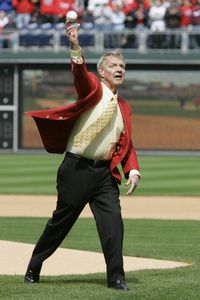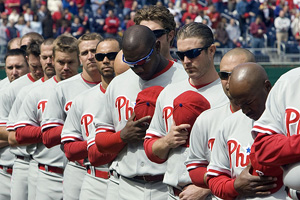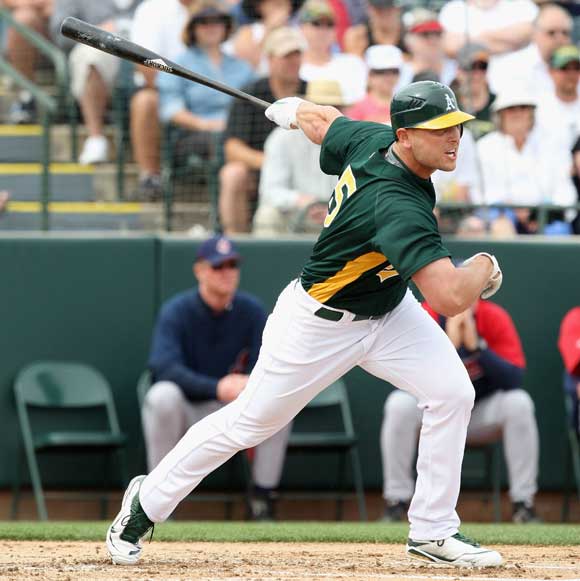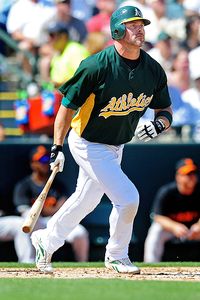PHILADELPHIA -- He was so much more than the voice of the Phillies. Harry Kalas
was the Phillies.
He didn't just describe the games. His voice took hold of those games and made them his personal amphitheater.
The home runs weren't officially home runs until Harry Kalas told you they were outta here.
The long outs didn't make Philadelphia's hearts flutter unless the volume on every speaker suddenly quadrupled and Harry announced they've got … a … chance .
Strike three wasn't strike three until Harry The K gave it that little chuckle and reported some Phillies pitcher had just struck some poor, overmatched schmoe with a bat "right on outta there."
And when the impossible happened, when a Word Series title run erupted in front of his eyes, his town couldn't be totally sure this mind-warping event had actually happened until the great Harry Kalas' golden voice exploded with the words: "The Philadelphia Phillies are 2008 world champions of baseball."
So here is what people like me, people who have lived most of our lives in Philadelphia, are wondering on this sad and tragic day:
How are we going to do this?
[+] Enlarge

AP Photo/Tom MihalekHarry Kalas threw out the first pitch before this year's Phillies season opener.
How are we going to go on in a world with no more "outta heres?"
How do we fill the unfillable void that will hang over us forever now as we try to contemplate life, and baseball, without Kalas?
Can't be done. Can it?
The games will go on. The sport will go on. Voices will crackle out of our TV speakers. That's the way it has to work. That's the way it has always worked.
But we don't have to pretend it will ever be the same, because when you've spent 6,000 nights, over four decades, listening to Harry Kalas put his inimitable stamp on a baseball game, it's way too simple to say baseball will never sound the same.
Baseball in Philadelphia will never be the same.
I'm one of the lucky ones. I got to know one of the special human beings on this planet. It was one of the great thrills of my career.
Once, I was just one of the fortunate hordes who had the pleasure of listening to Harry Kalas. Next thing I knew, I was working alongside him.
Back when I was a rookie beat reporter for The Philadelphia Inquirer and something memorable would happen on the emerald field below me, I'd often find myself thinking: I wonder how Harry called that one?
His voice, his presence, was that powerful. Even when you were witnessing something live, with your very own eyes, you still felt as if you were missing something -- because you hadn't heard Harry describe it.
If it had been only me thinking those thoughts, I'd have gotten therapy and tried to get that little voice out of my head. But it wasn't just me. Ohhhhh no.
Those players down there were way more addicted to that voice than I was.
Back on May 10, 2002, Phillies center fielder Doug Glanville hit an inside-the-park home run, the only inside-the-parker of his career. You know what he remembers about it now? Kalas' call of that magic moment.
The second he crossed home plate, Glanville said, "I wanted to hear him announce it. That was every bit as important to me as running around the bases."
Wait. Hold on here. You mean this man had just done something very few human beings have ever done, and all he could think of was the sound of That Voice? How can that be, you ask? Because it was Harry. That's how.
"Harry had that special gift," Glanville said Monday. "Just with his words and the emotion in his voice, he could take you to that game and put you right in that moment. If I was trying to explain to somebody what it's like to hit an inside-the-park homer, I'd say, 'Just listen to Harry call it.'"
But it wasn't only Glanville. When something big -- especially something really, really big -- came along, Kalas' voice towered over the event like a thunderclap from the heavens.
Let me transport you back to April 18, 1987. It's a day I'll never forget. I got to see Mike Schmidt hit his 500th home run that day. But that's not the part I'll never forget.
The scene that is lodged in my brain forever was a scene that took place long after Schmidt's emotional home run trot. The interviews were over. The players were all dressed. The bus to the airport was almost ready to leave.

NFL.com Video
NFL Films takes a look back at the career of legendary broadcaster Harry Kalas.
Then Harry Kalas entered the room.
It just so happened that he and his broadcast buddies had brought with them a tape of Kalas' still-indelible call. And so, right then, right there, life in that room screeched to a halt. Everything stopped. The bus could wait.
All 25 players gathered around the tape recorder. The "play" button was pushed. And here came That Voice:
" There it isssss. Nummmmmber 500. The career 500th home run for Michael Jack Schmidt. And the Phillies have regained the lead in Pittsburgh, 8-6."
They listened to it once, and they roared so loudly the walls shook. So then they listened to it again. And again. And again. And again. Screaming just as loudly every time.
That's when it hit me: Even they didn't realize what had just happened here -- not until they'd heard Harry The K put it into words.
Well, you know what? At least those words live. Still.
I heard them all over the airwaves Monday. It's the one consolation on days like this. Because Kalas did what he did, because he uttered his special brand of poetry into a microphone, the words live on.
We need them now. We need to hear those words again. And again. And again. And again.
We need That Voice because it has been such a constant in all our lives for as long as most of us can remember. And not just at game time.
When I heard the sad news Monday, I called my daughter Hali -- one of the great Harry The K fans on earth. Through the tears, she told me she had just changed the ring tone on her cell phone -- to the sound of Harry Kalas calling the final pitch of the 2008 World Series.
Later, my wife, Lisa, tried calling our neighbors, Bob and Karen Scheur, because we knew they'd want to know. They weren't in. But their answering machine clicked on -- and there was Harry Kalas' voice informing us that Bob and Karen had just gone on a lonnnnnng drive, and they were outta here … so please leave a message at the sound of the beep.
[+] Enlarge

AP Photo/Evan VucciA moment of silence in memory of Harry Kalas was observed before the Phillies' game with the Nationals on Monday in Washington.
"The funny thing is," Bob told me later, "that in November, Karen finally said, 'It's time to change the tape.' So we did. But as soon as we did, my friends would call and say, 'Hey, what happened to Harry?' So when it was time for pitchers and catchers, we changed it back. It's one of the rites of spring. Harry's back."
I could relate to that feeling -- totally. In fact, my last conversation with Harry came just a couple of weeks ago, in Florida. Pitchers and catchers had reported weeks earlier. The games had been going on for nearly a month. But for the first time ever, those games were going on without Harry.
He'd had some medical issues, described as nothing serious. So the Phillies were muddling along without him as best they could. And then, one day, I was walking down a ballpark hallway and there he was.
"It's a Harry The K sighting," I said. "Now we can finally get this season started."
He laughed. We shook hands. We talked a little baseball. He was ready to go. And now, so was I.
But I was only half kidding. It wasn't baseball season without Harry Kalas -- not for me. And not for millions like me.
So now what?
There will be a season. And in time, I'm sure, we'll be grateful there's a season.
But it will take some getting used to -- because, for millions of Philadelphians, Harry was what baseball sounded like.
If there's a rhythm to the heavens, if there's a script to every life, then we can take some solace in knowing there was an amazing finish to Harry Kalas' script.
In the final game he ever called, on Sunday in Denver, Matt Stairs gave him one final, dramatic, game-winning outta here .
Before the final home game Harry ever called -- on Wednesday, when the Phillies received their World Series rings -- he was handpicked by team president Dave Montgomery to throw out the first pitch.
And in the final postseason game he ever called, he got to tell all those people who loved him that the Phillies -- his Phillies -- were "2008 world champions of baseball."
That was their moment. But he made it his moment. And that's only fitting because, for the people of Philadelphia, Harry Kalas didn't just describe their moments. He made their moments real.
Senna out of Gunners tie
Harry Kalas, Philadelphia Phillies broadcaster and NFL Films voice, dies at 73 in Washington
Primera Division round-up
Howard Bryant: Jason Giambi back in his comfort zone with Oakland A’s
Senna out of Gunners tie
Harry Kalas, Philadelphia Phillies broadcaster and NFL Films voice, dies at 73 in Washington
Primera Division round-up
Howard Bryant: Jason Giambi back in his comfort zone with Oakland A’s











